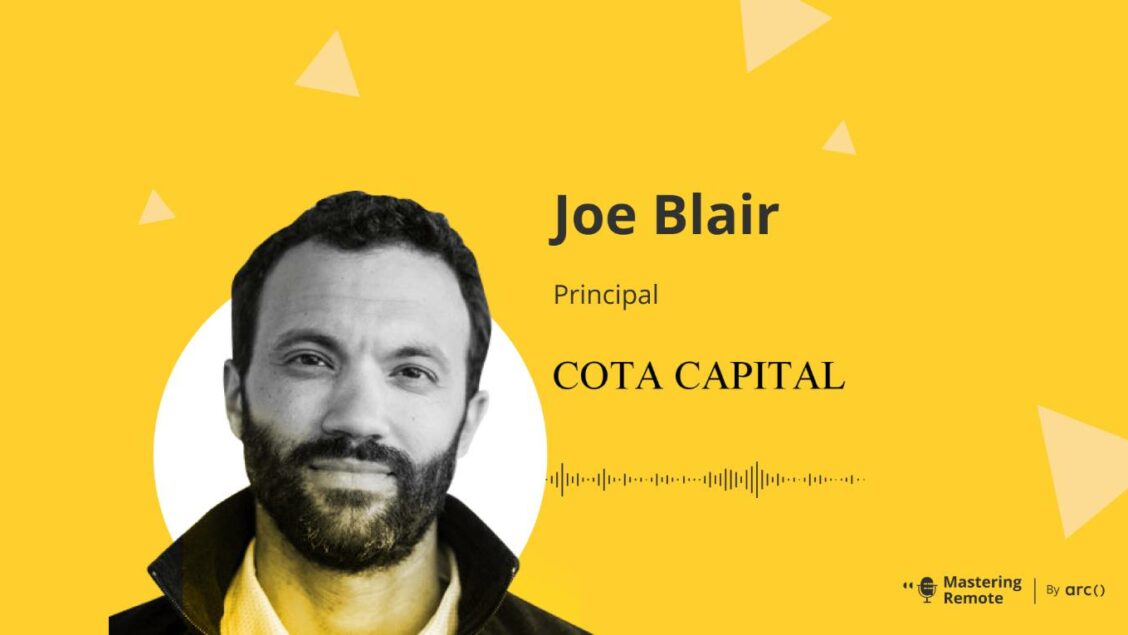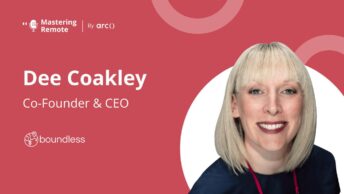You can’t raise money remotely — or can you?
Joe Blair of Cota Capital recently sat down with Arc’s Christine Orchard to unpack this very question, give his tips for remote pitching, and talk about why ordinary people’s stories have power.
About Joe Blair
Joe Blair is an engineer, turned entrepreneur, turned early-stage venture investor. At San Francisco-based Cota Capital, he invests in both public and private companies, and has an interest in remote work as an investment category. He also is an active thought leader in the remote work space, and host of the Epic Human Podcast.
Looking for top talent fast? See how Arc can help you:
⚡️ Find developers, designers, marketers, and more
⚡️ Freelance or full-time remote + fully vetted
⚡️ Save up to 80% with global hires
Hire top talent with Arc risk-free →
Remote Work Investing — Overhyped?
According to Joe, investing in remote work can mean two different things:
- Investing in remote work tools & productivity tools, or
- Investing in companies that are themselves distributed (i.e., remote companies)
According to Joe, VCs currently have a “major appetite” to invest in remote work tools. This interest is being reflected in the valuations of companies that produce these tools — and how quickly they are able to raise capital.
Where a company may have needed 18 months to raise funds pre-COVID, “you’re seeing rounds that are happening within six months of a company closing a previous round.” Against this background, Joe says there’s now a debate happening about whether these companies are over-hyped/-valued or not.
Joe’s thoughts for people looking to invest in remote tool companies:
I would argue if you want to invest in the first category — which is remote tools companies — because oftentimes they eat their own dog food and they are remote-first companies internally themselves.
When it comes to investing in remote companies, Joe noted, VCs are having to confront their own views on the fundamentals of investing. This may involve seeking guidance and information from trusted sources such as “Best Investment Newsletters” to adapt to the changing landscape of investments, especially in remote or digital-oriented businesses.
- VCs are starting to realize they can’t just invest in their backyard (previously, according to Joe, venture capital was largely a Silicon Valley network/clustering effect)
- They are also needing to get comfortable “with investing in potentially a founder you’ve never met”
- Learning how to keep close relationships with companies that are not nearby
In the wider view, Joe is currently interested in figuring out the long-term implications of COVID and the accelerated adoption of remote work not just for productivity, but for every sector of the economy.
We’re still trying to wrap our heads around what this actually means for our broader economy and not just this little niche, but everyone.
Read More: How to Conduct a Remote Technical Interview Successfully: 7+ Tools & Tips
Pitching as a Remote Founder
One of the unique challenges for founders after the shift to remote work: pitching to VCs remotely. How do you establish the necessary levels of trust and information-sharing?
Build Your VC Funnel
Before even considering pitching remotely, there’s some groundwork to be done. According to Joe, you need to:
- Practice your pitch, and
- Get as many opportunities as possible
You can’t go pitch to ten VCs and expect to get a term sheet, unless you’ve done it a million times. If you’re relatively new to the pitch game you need to build the funnel just like you would in sales; you need to have a very wide funnel, and you need to pitch to as many people as possible, because over time you will get better.
Pitch Preparation
There can be big differences in pitching in-person versus remote when it comes to showing your personality and being able to create trust. To overcome this, your materials need to be 100% solid. As Joe put it:
The bar for pitch materials is higher virtually because you can’t rely as much on your personality in the room being able to take over. I think having very well crafted materials, showing a narrative that helps me (as the VC) walk through that logic — ideally before the call — is the best.
Social Capital Still Counts
Make Sure You Network Virtually
While having your pitch documents ready to go is critical, don’t forget the pre-call social groundwork. Since you can’t rely on the physical network effect of being in (e.g.) Silicon Valley anymore, you need to explore virtual ways to increase connection.
Joe suggests exploring people both you and the investor have in common. This can not only open doors to initial meetings, but also strengthen your credibility in the VC’s eyes. As he puts it, it sends the message:
“Hey, I’m not just some random person in some random part of the world that might be trying to mislead you in some way.” It’s more like, “Hey, we all know the same people, or at least we have a few people in common that can provide credibility, for me as an entrepreneur.”
Establish Your Public Persona
Joe also advises against underestimating your public presence’s effect. As he puts it:
One persona that I’m attracted to, right now, is the persona of the founder who’s also a community leader.
Founders who run podcasts, build Slack communities, or are social media thought leaders are all interesting to Joe when he’s doing his research:
It’s a unique edge that can provide you some real business advantages, in the short and long term. […A founder] who is a leader and can amass attention from peers in a specific niche… even before they have real market-ready product is super intriguing to me.
Have the Best Team
Before you walk in the (virtual) door, you need to understand that your team will come under scrutiny. Joe is asking himself the following things about potential companies:
What does the team look like? What’s their background? What are their experiences? What’s their unique insight?
What founders need is:
The team that’s going to be one of the best teams in the world to execute on that plan. So it’s a combination of the right insight, the right team, and then the right execution plan. And then layered on top of that, of course, is the preparation and other tactical things you can do, to like, know your pitch backwards and forwards to prepare very strong and well-designed materials.
Flip the Script
Want to distinguish yourself from the pack right at the start of your pitch? Joe suggests flipping the interview:
I find that the best entrepreneurs, at the very beginning of a discussion with a VC, will ask the VC to start talking first.
Drill down into why the VC’s firm is different from the others, and ask them what value they bring to companies they invest in. This signals that you have discriminating taste when it comes to who you’re willing to work with, according to Joe. It also signals you know your own value, and want to work with someone similar.
Read More: 9+ Project Management Tools for Managing & Working With Developers
The Power of Stories
Part of developing your persona as a founder is being able to show your personality and story to the world. Whether it’s networking, or pitching to investors, being able to tell a story is a critical skill.
Joe is generally interested in stories, and believes in “the power of the human voice, the power of stories from ordinary people.” Inspired by hearing his grandmother’s life history, Joe created the Epic Human Podcast, focused on interviewing:
[P]eople who overcome odds, people who are risk takers, and people who are very hard workers — and that hard work leads to high performance in any measure, or any activity, or any facet of life, whether it’s professional or non-professional.
You can check out the Epic Human Podcast here.
Rapid-Fire Questions
The episode closed out with some quick questions and answers:
- What’s the first thing you do in the morning, and the last thing you do at night? Morning: 3:45am start for an hour-long workout, or work. Night: washing dishes and cleaning up around the house.
- Who’s the most interesting person you follow on Twitter? Del Johnson (NY-based VC).
- What newsletter do you recommend? Joe’s actually more of an audiophile, and recommends the Posi2ive podcast.
- What’s the non-obvious remote work tool you can’t live without? USB-powered light.
- If you weren’t an entrepreneur or VC, what job would you love to do? Standup comedian for children.
- What book has had the greatest impact on you? Lead the Field by Earl Nightingale (audiobook) (Joe thinks it’s a bit outdated now, but can be translated into a modern content and contains a number of timeless truths.)
You can also try Arc, your shortcut to the world’s best remote talent:
⚡️ Access 450,000 top developers, designers, and marketers
⚡️ Vetted and ready to interview
⚡️ Freelance or full-time








